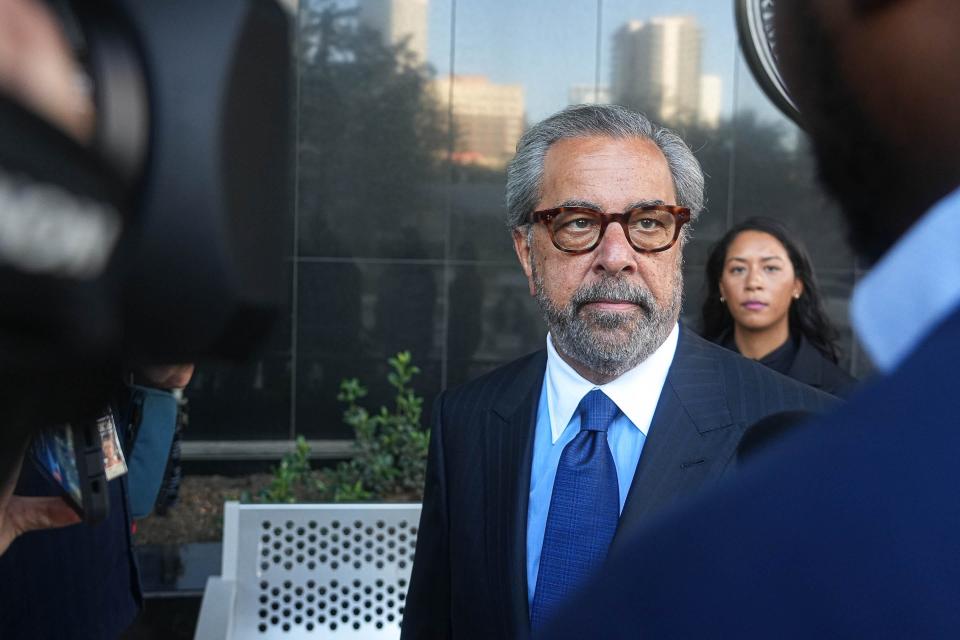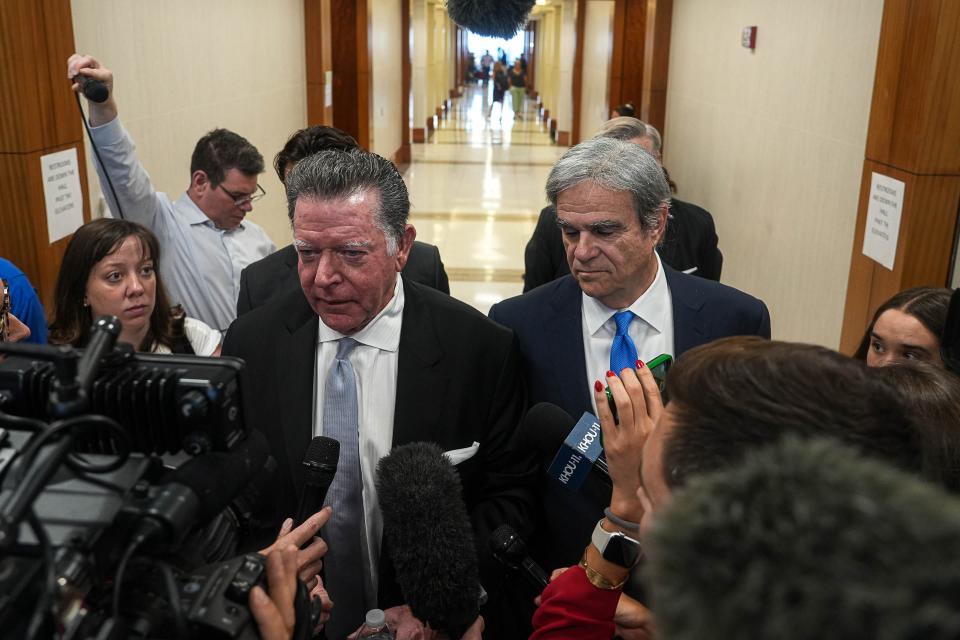Judge denies Texas AG Ken Paxton's motion to dismiss fraud case on speedy trial concerns
- Oops!Something went wrong.Please try again later.
HOUSTON — District Court Judge Andrea Beall denied Attorney General Ken Paxton's last-ditch effort to have his nine-year-old felony securities fraud case thrown out Friday, and emphasized the case would be tried April 15.
Paxton's lawyers filed a motion Feb. 6 to have the case thrown out, alleging he was denied a speedy trial.
After Paxton's defense team and prosecutors argued their case for roughly 15 minutes each Friday, Beall, a Democratic judge in the 185th District Court in Houston, rejected the attorney general's motion.
In a surprise turn of events, Judge Beall also allowed one of the state's two special prosecutors, Kent Schaffer, to withdraw from the case. Prosecutor Brian Wice appointed Houston criminal defense lawyer Jed Silverman in his place.
In July 2015, a grand jury in Collin County charged Paxton, then a Republican state senator from McKinney, with two first-degree felonies after he was accused of defrauding investors four years earlier by failing to disclose he was paid to recruit them. He was also charged with soliciting clients for a securities firm without a state registration to do so — a third-degree felony. He had been disciplined by the State Securities Board in 2014 for the latter violation.
But for almost nine years — far longer than the vast majority of other state-level felony cases last, and far longer, some say, than anyone beside Paxton could have dodged a verdict — Paxton's team and state prosecutors have been locked in a game of legal chutes and ladders. Moving from Paxton's home turf of Collin County to Democratic stronghold Harris County, they've passed by three different presiding judges, filed dozens of motions and clashed over legal technicalities and special prosecutors' salaries.
Paxton's team motioned to have the case dismissed for what it called an "excessive" and unconstitutionally delayed trial in a Feb. 6 filing, blaming the state for the postponements. Paxton's lawyers highlighted the state's decision to move the case to Houston, where they argued Paxton would face a fairer proceeding than in Collin County, which he had represented as a state representative for 10 years and state senator for two years.
But Paxton had never requested or filed a grievance over speedy trial matters before, which makes that argument unlikely to convince a judge, said former district and appellate judge Charlie Baird, who is not involved in the case.
"Paxton has acquiesced to this delay, and in fact is responsible for part or most of the delay himself," Baird, now a criminal defense lawyer in Travis County, told the Statesman. "You have to request a speedy trial in order to be granted one."
State special prosecutors ridiculed Paxton's argument in their response to the filing.
"'Some people believe with great fervor preposterous things that just happen to coincide with their self-interest,'" the prosecutors wrote, quoting from a 1986 opinion against a "tax protester." "Ken Paxton's efforts to dodge prosecution ... by arguing that the delays he created somehow denied Paxton a speedy trial reveals that he is the poster boy for this axiom."

The securities fraud charges are among several other legal troubles Paxton has tried but failed to shake off, as former Texas Attorney General and current U.S. Sen. John Cornyn highlighted during a social media spat between the two Republicans on Tuesday.
"Ken, your criminal defense lawyers are calling to suggest you spend less time pushing Russian propaganda and more time defending longstanding felony charges against you in Houston," Cornyn wrote in a post on X, "as well as ongoing federal grand jury proceedings in San Antonio that will probably result in further criminal charges."
Cornyn is referring to a federal investigation of Paxton that began after the attorney general's top aides filed whistleblower complaints to the FBI against him, accusing him of abusing his office to help his friend and campaign donor Nate Paul escape an FBI probe. Federal prosecutors seated a grand jury and began secret proceedings in San Antonio in August. Separately, those aides are suing Paxton for retaliation against them in a case that Paxton has similarly pulled out every stop to dismiss or delay.
Most recently, Paxton has filed a motion saying he will not contest the whistleblowers' allegations.
More: Judge again rejects AG Ken Paxton's motion to block his deposition in whistleblower case
Paxton is also facing a lawsuit by the Texas State Bar, arguing that Paxton falsely claimed to have uncovered voter fraud in the 2020 presidential election. The case is on hold in a Dallas-based appeals court.
Paxton's supporters have remained loyal throughout, emboldening the attorney general to pursue a scorched-earth campaign against supporters of the failed attempt to oust him from office through an impeachment proceeding.
Paxton's defense attorneys did not immediately respond to the Statesman's request for comment.
After a scheduled April 15 trial in Houston, Beall will decide whether Paxton is guilty of securities fraud, the punishment of which carries up to 99 years in prison.

This article originally appeared on Austin American-Statesman: Judge denies Texas AG Ken Paxton's motion to dismiss fraud case

